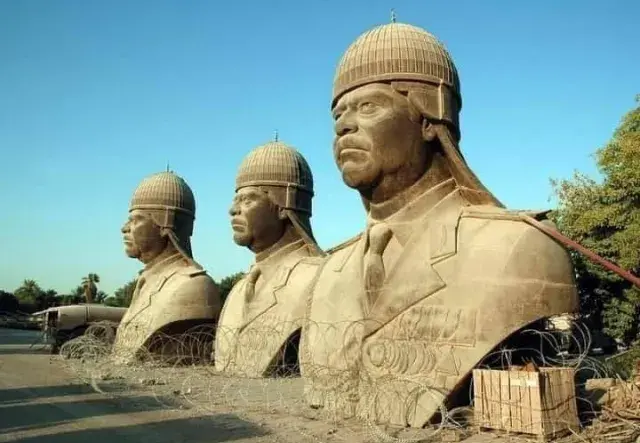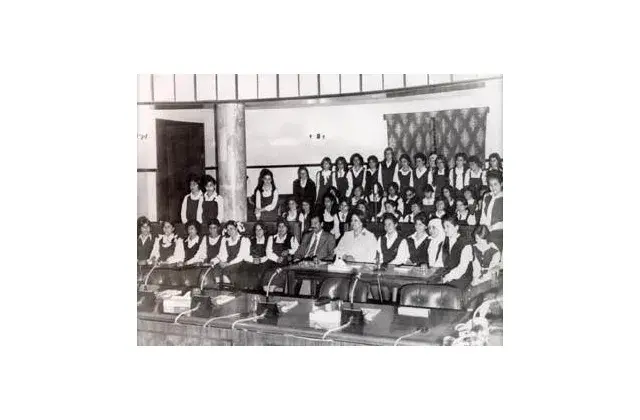The 2003 Invasion of Iraq and the Emergence of Religious Insurgencies (2003 - 2011)

Jacques Baute, Director of the IAEA’s Iraq Nuclear Verification Office, stated in his report published in June 2004: “[…] they had found no evidence, up to March 2003, that the programme had been revived since 1998." Notwithstanding the above, and despite worldwide protests and demonstrations, the United States, in a coalition with the United Kingdom, Australia, Poland, and other allies, invaded Iraq. The invasion began on 19 March 2003. On 1 May 2003, U.S. President George W. Bush delivered the infamous "Mission Accomplished" speech aboard the USS Abraham Lincoln, declaring the end of major combat operations. However, the war and violence in Iraq continued for years thereafter, with widespread criticism of the premature declaration.
The ‘liberation’ was accompanied by countrywide lootings of especially governmental facilities which included all means of infrastructure and services. These lootings are commonly known in Iraq as 'al-hawasim' (meaning 'the great looting battles'). A crowd of furious Iraqi people stole everything that can be stolen as a revenge for their sacrifice. At this point it is noteworthy to mention, that comprehensive thievery and demands for bribes within the ordinary population had already started during the 1990s as a result of the sanctions. As an example, for the 2003 lootings, it is estimated that around 15,000 artefacts of the Iraq museum were stolen. By the beginning of 2003, the National Museum of Modern Art in Baghdad housed a collection of approximately 7,000 artworks. Following the looting after the U.S. invasion, reports suggest that around 1,700 of these pieces were recovered over time, while many others remain missing. The claim that 2,112 items remained in the museum's possession after the looting is an overestimate, as the total recovered artworks stood at about 1,700 by 2010. Some of the stolen pieces are believed to have been trafficked through the black market.
The Coalition Provisional Authority (CPA) was officially established on April 21, 2003, and governed Iraq until June 28, 2004, when sovereignty was transferred to an Interim Iraqi Government. Paul Bremer was the country’s chief executive during the transitional period. He banned the Baath Party and removed its members from leading positions. On 23 May 2003, he dissolved the Iraqi army and on 7 June 2003, he legalised the militias of the former opposition parties and declared them to be the new Iraqi armed forces. Parliamentary elections were held in Iraq on 30 January 2005 to elect the new National Assembly, alongside governorate elections and a parliamentary election in Kurdistan Region. The new constitution was approved on 15 October 2005. The 2005 Constitution stated that “the Republic of Iraq is a single federal, independent and fully sovereign state in which the system of government is republican, representative, parliamentary, and democratic. Islam is the official religion of the State.” However, the reality was different. In the wake of the invasion, violent insurgencies, most of them religiously motivated, emerged and ripped the country. In February 2006, the insurgencies even escalated into a sectarian civil war which would last until 2008, and longer. The reasons for these insurgencies are many and would need a detailed analysis, but one root goes back to toppled Saddam Hussein.
Hiding Saddam was captured on 13 December 2003. The Iraqi Special Tribunal sentenced him to death by hanging which was executed on 30 December 2006. Between 2003 and 2004 the Combined Forensic Team of the CPA found 259 mass graves. His regime’s strategy of Baathification created misperceptions about Iraqi state-society relations, especially in regard to its control over the religious landscape. Religious extremists and sectarian ideas had always existed in the underground. Over three decades, Saddam had been able to build up an effective system of control to suppress these religious actors and their ideas. This foreign misperception laid the groundwork for the religious insurgencies that followed. Another mistake during the interim government was the introduction of muhassasa (Arabic for “apportionment” or “quotas” -– a system of political power-sharing in Iraq), an informal consociationalism adopted in 2003 which later would lead to prioritising party interests over technocratic competence. It would divide government power among party members who would hold the authority to appoint some 800 civil service positions across ministries and which would be widely misused during the next two decades.
On 21 October 2011, U.S. President Obama announced the full withdrawal of troops from Iraq, leaving an ambivalent legacy. The result of the U.S. occupation was a troubled and increasingly insecure country in which insurgency, lawlessness and sectarian conflict claimed – yet again – a growing number of Iraqi lives.
This article was written by Hella Mewis and is licensed under CC BY-NC 4.0.






